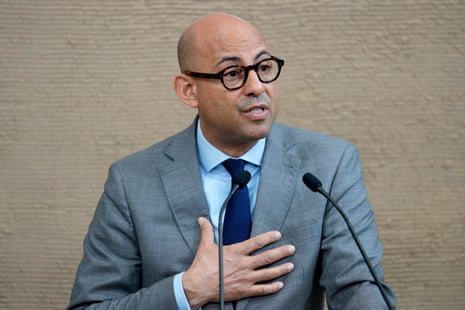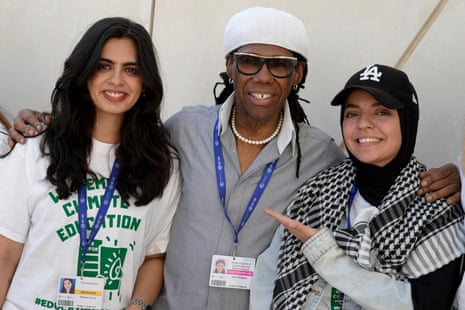Ajit Niranjan
As day six begins of talks in Dubai’s Expo City, more sobering scientific news should focus minds there on achieving a result.
A new report warns the Earth is on the verge of crossing five catastrophic climate tipping points as a result of carbon pollutions in the atmosphere, with three more in sight in the 2030s if the world heats more than 1.5C (2.7F) above pre-industrial levels, reports Ajit Niranjan, the Guardian’s European environment correspondent.
“Tipping points in the Earth system pose threats of a magnitude never faced by humanity,” said Tim Lenton, from the University of Exeter’s Global Systems Institute. “They can trigger devastating domino effects, including the loss of whole ecosystems and capacity to grow staple crops, with societal impacts including mass displacement, political instability and financial collapse.”
The tipping points at risk include the collapse of big ice sheets in Greenland and the West Antarctic, the widespread thawing of permafrost, the death of coral reefs in warm waters, and the collapse of atmospheric circulation in the North Atlantic.
Unlike other changes to the climate such as hotter heatwaves and heavier rainfall, these systems do not slowly shift in line with greenhouse gas emissions but can instead flip from one state to an entirely different one. When a climatic system tips – sometimes with a sudden shock – it may permanently alter the way the planet works.
Key events
The conflict in Gaza has loomed large over this year’s Cop28 climate talks in Dubai. While delegates have discussed plans to tackle climate change, on the sidelines activists have tried to draw attention to the slaughter of people in the territory.
But while many climate justice groups have quickly pivoted to campaign around Gaza, in some countries the issue is far more contested, and prominent figures in climate activism, in particular Greta Thunberg, have been criticised for espousing the Palestinian cause.
A team of reporters from the Guardian’s environment desk (including me) put together this story on the emerging controversy.
When Greta Thunberg posted a photo of herself holding a “stand with Gaza” sign on Instagram in October, the backlash in Israel and Germany came hard and fast.
An Israeli Defense Forces (IDF) spokesperson initially told Politico that “whoever identifies with Greta in any way in the future, in my view, is a terror supporter,” although later retracted his comments. The official X account of Israel said “Hamas doesn’t use sustainable materials for their rockets” and told Thunberg to speak up for its victims. The Israeli education ministry said it would strike any reference to the Swedish climate activist from its curriculum.
In Germany, politicians and pundits across the political spectrum demanded that the national branch of Fridays for Future, the student protest movement that Thunberg started in 2018, distance itself from her views. The group put out a statement underlining its support for Israel’s right to exist and, in the weeks that followed, explicitly distanced itself from social media posts made by the international group. Germany’s leading news magazine Der Spiegel ran a lengthy article with personal comments on Thunberg’s childhood character and appearance under the headline: “Has Greta Thunberg betrayed the climate movement?”
The violence in Israel and Gaza since 7 October has become an unexpected flashpoint for climate activists in rich countries. As world leaders meet for the Cop28 summit in Dubai, the loose collection of movements, many of which have built their support around inclusivity and global justice, are divided on whether or how to take a stand on the conflict.
Medical students have staged a protest outside the main meeting rooms at Cop28.
Holding banners reading “protect health, end fossil fuels” and “climate crisis = health crisis”, they mimed giving cardiopulmonary resuscitation to the Earth.
The protest was organised by members of the International Federation of Medical Students Associations.

Don’t fall into the trap of point scoring, says UN climate chief
Countries negotiating at Cop28 must not fall into the trap of point scoring and “lowest common denominator politics”, Simon Stiell, the UN’s climate chief, has said.
Stiell, who is executive secretary of the UN Framework Convention on Climate Change, the structure under the auspices of which the climate summit is held, spoke at a press conference in Dubai as Cop28 reached its midpoint. He said:
All governments must give their negotiators clear marching orders. We need highest ambition, not point scoring or lowest common denominator politics.
We have a starting text on the table … but it’s a grab bag of wishlists and heavy on posturing. The key now is to sort the wheat from the chaff.
There are many options that are on the table right now which speak to the phasing out of fossil fuels. It is for parties to unpick that, but come up with a very clear statement that signals the terminal decline of the fossil fuel era as we know it.

Leading climate scientists have insisted “the link between climate science and fossil fuel phase-out is unequivocal”, in response to Sultan Al Jaber’s claim there is “no science” indicating that a phase-out of coal, oil and gas is needed to restrict global heating to 1.5C.
The Guardian on Sunday revealed the comments by the Cop28 president, which have overshadowed the climate talks as delegates negotiated the future of the planet and the fossil fuel economy. They have led to widespread condemnation.
An open letter published by the Club of Rome on Wednesday and signed by about 75 scientists said:
For all intents and purposes, moving towards the phase-out of fossil fuel combustion is necessary to keep the 1.5C goal of the Paris Agreement within reach.
The letter is an unambiguous statement by some of the world’s leading climate scientists. They say that carbon dioxide removal technologies will also be necessary to reach net zero emissions by 2050.
Scenarios consistent with this goal require a complete phase-out of coal by 2050 and rapid phase-down of oil and gas (halved every decade). After 2050 the world needs to rapidly move into net negative emissions, particularly after a number of decades of 1.5C overshoot.
Good times! The guitarist Nile Rodgers has made an appearance with activists at Cop28.
Rodgers is co-founder of the We Are Family Foundation, which staged a joint #Education4Earth event with Earth Day at Cop28’s Blue Zone.

Is the UK avoiding press scrutiny at Cop28?

Fiona Harvey
It’s hard to avoid the impression that the UK government is hiding from scrutiny at Cop28. Several ministers have been in attendance, but we have passed the halfway point and not one has held a press conference or any form of press meeting, with UK press or with international media.
Graham Stuart, climate minister; Andrew Mitchell, minister for overseas development; Richard Benyon, a minister with both FCDO and Defra; David Cameron, foreign secretary – journalists tried in vain to get any of them to hold any form of press briefing at which they could be questioned.
The prime minister, Rishi Sunak, held a small Q&A with only lobby journalists, most of whom have no experience of Cops, during his blink-and-you’ll-miss-it appearance at Cop, when he spent less time here than he did on the plane.
Ministers are clearly taking their avoidant lead from Sunak, and doubtless they will claim their diaries are full with meeting international counterparts.
But don’t let anyone pretend that this kind of hiding away is normal. Every other democracy here with ministers attending is briefing their press extensively, and often international media too, some on a daily or almost daily basis, and likely to grow more frequent.
This is 17th Cop I’ve attended as a journalist and I can state categorically that this failure to engage with the press by the UK government is not only unusual, it is unprecedented.
Even last year, under the same prime minister, with his equal unconcern for climate issues and the UK’s standing at Cops, ministers met the press – Grant Shapps, Graham Stuart, Thérèse Coffey and ministers from Treasury and transport all held extensive press meetings with ample opportunities to ask questions.
This Cop is being held in a country that lacks what we would regard as a free press, and is attended by scores of countries that lack a functioning democracy or where the press is gagged. One of the key themes of this conference is accountability – that’s at the heart of the global stocktake.
As a democracy – arguably one of the world’s oldest – the UK should be leading by example, standing up for the accountability and transparency of governments. Why won’t our ministers do what other democracies regard as basic? What are they afraid of?
This is a government that appears to have nothing to say in public about the climate crisis and the UK’s role in tackling it, and to want to evade scrutiny for the UK’s actions.
As negotiators wrangle over whether to agree a “phase-out” or a “phase-down” of fossil fuels, Vanessa Nakate, the Ugandan climate activist, this morning made a strident call for the ending of the extraction and burning of coal, oil and gas.
Until new fossil fuel projects are eliminated, and the burning of fossil fuels is ended, promises to help deal with the loss and damage caused by the climate crisis “will sadly mean little”, Nakate said.
She said:
If we want to be real about helping people who are living in vulnerable communities we need to address not just the symptoms of the climate crisis but also the root cause, and that is the burning of fossil fuels.
The first thing we should do to reduce loss and damage is to stop digging up and burning new coal, oil and gas. All of the flashy announcements about promised funding and scaling renewables and tree planting will sadly mean little if countries continue to expand fossil fuel development.
The success of Cop28 will not depend on speeches on big stages. The success of Cop28 will not depend upon piling new fancy promises on top of old broken promises. The success of Cop28 will depend upon whether or not leaders have the courage to call for for a just and equitable phase out of all fossil fuels, without excuses and exceptions.
Then and only then will our leaders have a chance to take care of the people on the front lines.
2023 will be the hottest year on record, says European climate monitor
Pressure is piling on negotiators at Cop28 after Europe’s climate monitor, the Copernicus Climate Change Service (C3S), on Wednesday announced that November had become the sixth record-breaking month in a row for average temperatures.
An “extraordinary” November smashed the previous November heat record, pushing 2023’s global average temperature to 1.46C warmer than pre-industrial levels, C3S said, according to AFP.
The announcement confirms that 2023 will be the hottest year on record, taking the title from 2016.
November also contained two days that were 2C warmer than pre-industrial levels. Not one such day had ever before been recorded.
Samantha Burgess, deputy head of C3S, said 2023 has “now had six record-breaking months and two record-breaking seasons”.
“The extraordinary global November temperatures, including two days warmer than 2C above pre-industrial (levels), mean that 2023 is the warmest year in recorded history,” she said.
Scientists say data from ice cores, tree rings and other sources suggest this year could be the warmest in more than 100,000 years.
Vladimir Putin will visit the United Arab Emirates on Tuesday, but seems unlikely to visit the Dubai Expo City site of the Cop28 climate talks.
The Russian president, who is subject to an arrest warrant from the international criminal court over his country’s invasion of Ukraine, is expected to meet the Emirati leader, Sheikh Mohammed bin Zayed Al Nahyan, in Abu Dhabi.
He is then expected to travel on to Saudi Arabia for a meeting with the country’s ruler, Crown Prince Mohammed bin Salman.
Putin is also scheduled to meet the Iranian president, Ebrahim Raisi, on Thursday for what his aide, Yury Ushakov, has described as “a rather lengthy conversation”, according to Tass, the Russian state-run news agency.
Neither Saudi Arabia nor the UAE has signed the ICC founding treaty, meaning they don’t face any obligation to detain Putin. The ICC’s warrant accuses him of the abductions of children from Ukraine.
The Associated Press, the US-based news agency, said Putin’s discussions were likely to focus on oil production.
Fossil fuel phase-out, politics and ‘pie-in-the sky thinking’

Damian Carrington
The biggest argument at Cop28 is the competing claims that a “phase-out” of fossil fuels is necessary to keep global heating within 1.5C (2.7F) above pre-industrial levels, or that a “phase-down” is acceptable, a debate amplified by the Guardian’s revelation of Sultan Al Jaber’s recorded comment that there was “no science” behind the former.
As Leo Roberts at E3G told me, the competing claims can result from the “translation of science into politics”.
This post from Ben Caldecott, the director of Oxford University’s Sustainable Finance Group, is insightful and scathing, and takes a swipe at Oxford’s Prof Myles Allen, an eminent climate scientist but the only one I know to have backed Al Jaber in the “no science” furore. Allen said Al Jaber’s comment was “perfectly accurate”.
Caldecott said: “If we can scrub from the atmosphere all the carbon emitted by future fossil fuel consumption, plus all the carbon emitted after we almost certainly overshoot a 1.5C degree carbon budget, then yes, [Sultan Al Jaber] and my very distinguished Oxford colleague Prof Allen are right: no fossil fuel phase-out is needed to achieve the aims of the Paris Agreement.”
“But mere analysts of economic, financial and political systems (like me) tend to think that this is pie-in-the sky thinking and nowhere near possible. Further, it is being used to justify continued avoidable fossil fuel use.
“The fossil fuel lobby often making these arguments have no actual plan to scrub carbon at such scales so quickly. It would be almost impossible to do so and would cost vast sums even if it were possible – much more than decarbonisation and without the co-benefits of cleaner, safer and more productive societies.”
“And yes, we obviously do need to scale safe and permanent carbon disposal (part and parcel of net zero), but that is never going to happen at the scale needed to offset like-for-like currently avoidable fossil fuel emissions. The finite techno-economic capacity we have to develop the means to scrub carbon needs to be focused on hard-to-abate emissions and then bringing us back to safe levels after we (probably) overshoot 1.5C, not sustaining existing fossil fuel interests.”
The Energy and Climate Intelligence Unit’s Cop28 newsletter, also addressed the issue:
“Some climate scientists have explained in tortuous detail how his comments could, technically, be right, whilst others have pointed to the IPCC’s clarity around the principal driver of 80% of the problem of climate change: the burning of fossil fuels.
“So unless we have $1tn a year to spare to pay to ramp up carbon capture and storage (CCS) from its 45m tonnes a year capacity now, to 32bn tonnes a year, it appears the obvious focus for Cop (sorry Darren from Exxon) may need to be phase-out of fossil fuels and ramp up of the renewables alternatives.”
The $1tn a year figure comes from new research, also from Oxford: “A high CCS pathway to net zero emissions in 2050 is expected to cost at least $30tn more than a low CCS pathway – roughly $1tn per year.”
As co-author Richard Black puts it: “That is at least $120 per year for every man, woman and child on the planet that we would be spending unnecessarily.”

Ajit Niranjan
As day six begins of talks in Dubai’s Expo City, more sobering scientific news should focus minds there on achieving a result.
A new report warns the Earth is on the verge of crossing five catastrophic climate tipping points as a result of carbon pollutions in the atmosphere, with three more in sight in the 2030s if the world heats more than 1.5C (2.7F) above pre-industrial levels, reports Ajit Niranjan, the Guardian’s European environment correspondent.
“Tipping points in the Earth system pose threats of a magnitude never faced by humanity,” said Tim Lenton, from the University of Exeter’s Global Systems Institute. “They can trigger devastating domino effects, including the loss of whole ecosystems and capacity to grow staple crops, with societal impacts including mass displacement, political instability and financial collapse.”
The tipping points at risk include the collapse of big ice sheets in Greenland and the West Antarctic, the widespread thawing of permafrost, the death of coral reefs in warm waters, and the collapse of atmospheric circulation in the North Atlantic.
Unlike other changes to the climate such as hotter heatwaves and heavier rainfall, these systems do not slowly shift in line with greenhouse gas emissions but can instead flip from one state to an entirely different one. When a climatic system tips – sometimes with a sudden shock – it may permanently alter the way the planet works.
Good morning! This is Damien Gayle, on the sixth day of the 28th Conference of the Parties climate change summit, or Cop28.
The Guardian will be liveblogging the negotiations throughout, as always, and we look forward to your contributions: please email me on [email protected] with thoughts and suggestions – or you can reach me on X, the social network formerly known as Twitter, at @damiengayle. Helena Horton ([email protected]) will be taking over later on.
The theme for today is multilevel action, urbanisation and built environment, and transport.
Meanwhile yesterday the main talking points at the conference included:
-
Widespread outrage at the news that a record number of fossil fuel lobbyists have been given access to Cop28
-
The news that agriculture and food systems had been left off the latest draft of the negotiating text on the global stocktake
-
Mary Robinson making her first comment since the row over the Cop28 president’s controversial response to her questions on the need for a fossil fuel phase-out, revealed by the Guardian.

